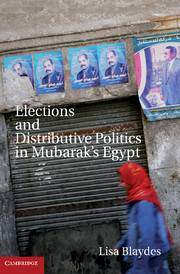36 results
The Politics of Legal Pluralism in a Muslim Society
-
- Journal:
- Nationalities Papers , FirstView
- Published online by Cambridge University Press:
- 13 May 2024, pp. 1-3
-
- Article
-
- You have access
- Open access
- HTML
- Export citation
Religion, family structure, and the perpetuation of female genital cutting in Egypt
-
- Journal:
- Journal of Demographic Economics / Volume 86 / Issue 3 / September 2020
- Published online by Cambridge University Press:
- 22 September 2020, pp. 305-328
-
- Article
- Export citation
Authoritarian media and diversionary threats: lessons from 30 years of Syrian state discourse
-
- Journal:
- Political Science Research and Methods / Volume 9 / Issue 4 / October 2021
- Published online by Cambridge University Press:
- 24 June 2020, pp. 693-708
-
- Article
- Export citation
Contesting Authoritarianism: Labor Challenges to the State in Egypt. By Dina Bishara. Cambridge: Cambridge University Press, 2018. 204p. $82.99 cloth, $29.99 paper.
-
- Journal:
- Perspectives on Politics / Volume 17 / Issue 4 / December 2019
- Published online by Cambridge University Press:
- 13 November 2019, pp. 1241-1242
- Print publication:
- December 2019
-
- Article
- Export citation
Muslim Trade and City Growth Before the Nineteenth Century: Comparative Urbanization in Europe, the Middle East and Central Asia
-
- Journal:
- British Journal of Political Science / Volume 51 / Issue 2 / April 2021
- Published online by Cambridge University Press:
- 05 November 2019, pp. 845-868
- Print publication:
- April 2021
-
- Article
- Export citation
Political cultures: measuring values heterogeneity
-
- Journal:
- Political Science Research and Methods / Volume 8 / Issue 3 / July 2020
- Published online by Cambridge University Press:
- 14 October 2019, pp. 571-579
-
- Article
- Export citation
The Impact of Holy Land Crusades on State Formation: War Mobilization, Trade Integration, and Political Development in Medieval Europe
-
- Journal:
- International Organization / Volume 70 / Issue 3 / Summer 2016
- Published online by Cambridge University Press:
- 30 May 2016, pp. 551-586
- Print publication:
- Summer 2016
-
- Article
- Export citation
The Feudal Revolution and Europe's Rise: Political Divergence of the Christian West and the Muslim World before 1500 CE
-
- Journal:
- American Political Science Review / Volume 107 / Issue 1 / February 2013
- Published online by Cambridge University Press:
- 28 January 2013, pp. 16-34
- Print publication:
- February 2013
-
- Article
- Export citation
Religiosity-of-Interviewer Effects: Assessing the Impact of Veiled Enumerators on Survey Response in Egypt
-
- Journal:
- Politics and Religion / Volume 6 / Issue 3 / September 2013
- Published online by Cambridge University Press:
- 14 January 2013, pp. 459-482
-
- Article
- Export citation
Bahgat Korany. The Changing Middle East: A New Look at Regional Dynamics. Cairo and New York: American University in Cairo Press, 2010. x + 282 pages. Cloth US$29.95 ISBN 978-9-774-16353-1.
-
- Journal:
- Review of Middle East Studies / Volume 46 / Issue 1 / Summer 2012
- Published online by Cambridge University Press:
- 09 March 2016, pp. 125-127
- Print publication:
- Summer 2012
-
- Article
- Export citation
Elite Competition, Religiosity, and Anti-Americanism in the Islamic World
-
- Journal:
- American Political Science Review / Volume 106 / Issue 2 / May 2012
- Published online by Cambridge University Press:
- 17 May 2012, pp. 225-243
- Print publication:
- May 2012
-
- Article
- Export citation
The Autumn of Dictatorship: Fiscal Crisis and Political Change in Egypt under Mubarak. By Samer Soliman. Stanford: Stanford University Press, 2011. 224p. $80.00 cloth, $22.95 paper.
-
- Journal:
- Perspectives on Politics / Volume 10 / Issue 1 / March 2012
- Published online by Cambridge University Press:
- 02 March 2012, pp. 205-206
- Print publication:
- March 2012
-
- Article
- Export citation
Anne Marie Baylouny, Privatizing Welfare in the Middle East: Kin Mutual Aid Associations in Jordan and Lebanon (Bloomington, Ind.: Indiana University Press, 2010). Pp. 316. $70.00 cloth, $26.95 paper.
-
- Journal:
- International Journal of Middle East Studies / Volume 43 / Issue 3 / August 2011
- Published online by Cambridge University Press:
- 26 July 2011, pp. 583-585
- Print publication:
- August 2011
-
- Article
- Export citation
5 - Electoral Budget Cycles and Economic Opportunism
-
- Book:
- Elections and Distributive Politics in Mubarak’s Egypt
- Published online:
- 04 February 2011
- Print publication:
- 22 November 2010, pp 77-99
-
- Chapter
- Export citation
11 - Egypt in Comparative Perspective
-
- Book:
- Elections and Distributive Politics in Mubarak’s Egypt
- Published online:
- 04 February 2011
- Print publication:
- 22 November 2010, pp 210-236
-
- Chapter
- Export citation
7 - Elections and Elite Corruption
-
- Book:
- Elections and Distributive Politics in Mubarak’s Egypt
- Published online:
- 04 February 2011
- Print publication:
- 22 November 2010, pp 125-147
-
- Chapter
- Export citation

Elections and Distributive Politics in Mubarak’s Egypt
-
- Published online:
- 04 February 2011
- Print publication:
- 22 November 2010
Bibliography
-
- Book:
- Elections and Distributive Politics in Mubarak’s Egypt
- Published online:
- 04 February 2011
- Print publication:
- 22 November 2010, pp 245-274
-
- Chapter
- Export citation
12 - Conclusion
-
- Book:
- Elections and Distributive Politics in Mubarak’s Egypt
- Published online:
- 04 February 2011
- Print publication:
- 22 November 2010, pp 237-244
-
- Chapter
- Export citation
1 - Introduction
-
- Book:
- Elections and Distributive Politics in Mubarak’s Egypt
- Published online:
- 04 February 2011
- Print publication:
- 22 November 2010, pp 1-25
-
- Chapter
-
- You have access
- Export citation

